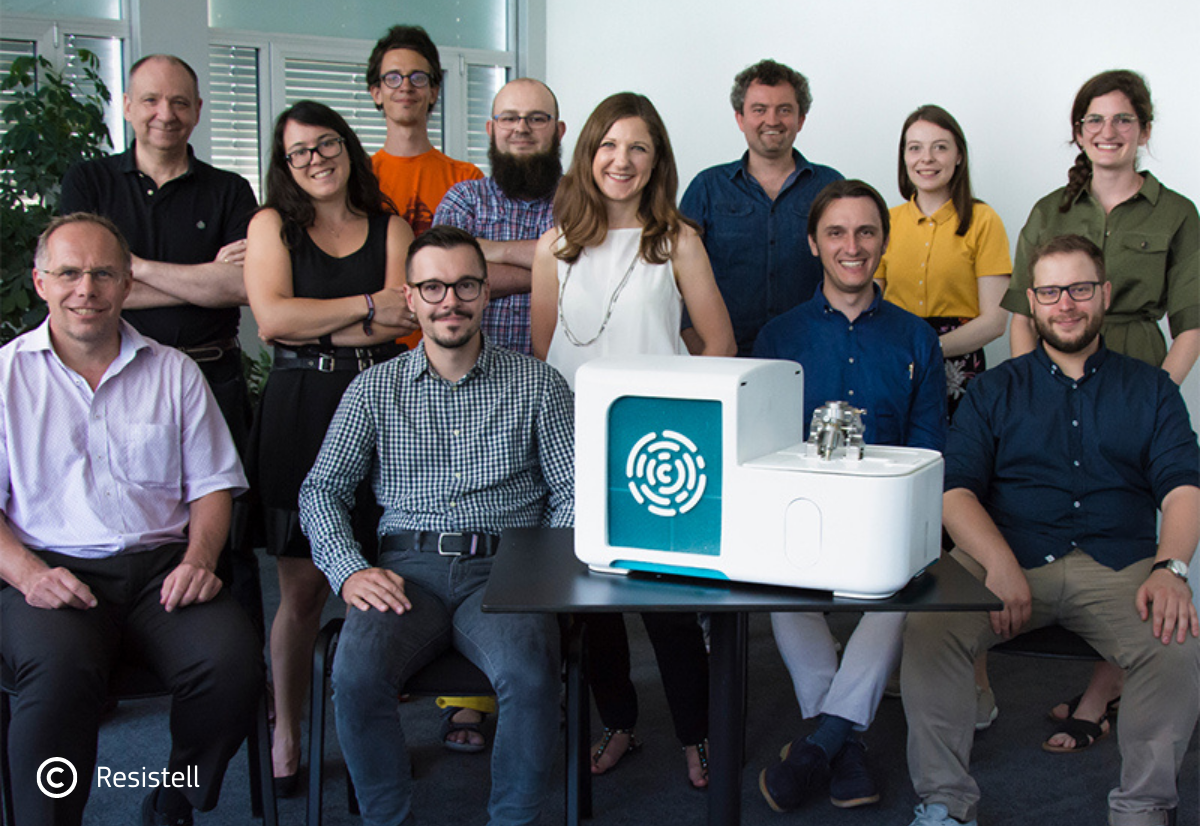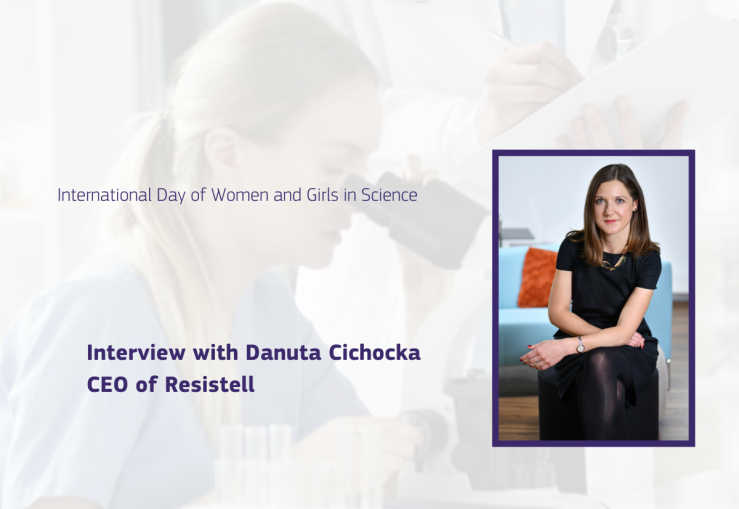Danuta Cichocka celebrates her birthday today – on the same day that the world celebrates the International Day of Women and Girls in Science. The microbiologist says that it’s a funny coincidence, but the colleagues call it “a birthday gift”. Danuta’s passion for life-science started very early, when she was at primary school, and never stopped growing. One day, she decided to turn this passion into business and founded her very first startup. Resistell is addressing one of today’s biggest challenges to global health: antibiotic resistance. The EIC-funded startup is developing a fast antibiotic susceptibility test and preparing a relevant technology for the coronavirus pandemic. On the International Day of Women and Girls in Science, we invite you to discover the story of the female scientist and entrepreneur from Switzerland.
Where is the passion for life-science coming from, and in your opinion, what is the most rewarding thing from working in this field?
I think that my passion for life-science started during my childhood. In primary school, I won some chemistry competitions, and this was the beginning of my interest in science. For me, the most rewarding aspect of this work is to be able to contribute to an area that I am passionate about and work to find a solution to slow down or prevent the development of Antimicrobial Resistance (AMR). Additionally, as a start-up founder, what I find the most interesting is that I am also able to create jobs for people who are as passionate as myself about this field. Many of them are also young women and that is very rewarding.
Antimicrobial resistance (AMR) was already one of the biggest global health challenges before COVID-19. Can you explain in more detail what answer Resistell is providing to this pandemic?
Resistell is not developing COVID-19 diagnostics, but we are developing a fast antibiotic susceptibility test, which is very relevant for the coronavirus pandemic indirectly. Apparently, during the COVID-19 pandemic, many patients received antibiotics (especially the patients who are treated at the hospital, in intensive care units – ICUs). Usually, when these patients enter the ICUs, they receive broad-spectrum antibiotics to prevent the development of co-infections. This happens mostly in the most severe COVID-19 cases and among the patients who die from this disease.
The direct reason for that is not the COVID-19 infection but the bacterial co-infection. Often these bacterial co-infections are acquired in hospitals and the ICUs. Currently, particularly for the patients in a severe state, there is no adequate diagnostic to streamline the right antibiotic treatment or even choose which patients should receive such therapy. We target this problem with a high-speed antibiotic susceptibility test, which can be provided on the first day when a potential symptom appears for such bacterial infection. It can help the doctor choose the right narrow-spectrum antibiotic instead of giving a broad-spectrum antibiotic.
In your Linkedin description, you mention that your key strength is bridging the gap between research and business. Can you tell which mindset is required to turn science into business?
On the one hand, I think it's necessary to understand the complexity of scientific subjects and the capacity to simplify them. I think this is very important, and it's challenging for scientists but also for business stakeholders. For example, in industrial communities, very often, they lack scientific knowledge, and for them, it's challenging to understand the details of the science behind the project. I think the capacity to target the audience's message without losing the core of the subject is very important. I believe that my scientific background helped me master this skill.

Did you encounter significant gender-related adversities during your career?
In Academia, industry, or start-up communities, men are in the majority, and being part of the minority always brings additional difficulties. The further in your career you get, the less female counterparts you have. I feel that we always have to be very professional, very well prepared, and still find support among male counterparts. Both in Academia and the Business Community, many men are willing to support women and give their hand to develop them further. The support doesn't need to come only from female counterparts. We count on male support very often, and we shouldn't be afraid to reach out to other men, especially if we are searching for role models, coaches, advisors, and supporters. Nowadays, many of them are aware of the difficulties women face and are willing to support us.
During an interview for the website Venture Lab, you said that being a mother and CEO of a startup company gives double satisfaction. Can you expand on these views?
Being a company founder and being a parent has something in common: you need to create the conditions for people to grow and develop; you give them security and a hand, and you make the circumstances that allow them to open their wings. It gives me much satisfaction to watch them fly. I think this applies to a mother and a founder. I have a lot of satisfaction in creating jobs in the company and raising money for topics that I believe are extremely interesting.
When you are a company founder, it's crucial to remember that leadership is not only about demanding work. It's also about creating conditions so that people can do their best and perform at a high level. The same applies to children: you create conditions that allow them to grow and develop, you give them financial and emotional support to achieve the goals in their lives.
Your birthday is today, precisely on the same day that we celebrate the International Day of Women and Girls in Science. Your colleagues already told us that they joke about it and say that it's your 'Birthday Gift'. Why do you think this day is so important and you see this day as a birthday gift?
It's a funny coincidence! I think it's an honour to be able to celebrate the International Day of Women and Girls in Science on my birthday. We are a minority, and it is more difficult for women to develop a career and achieve high positions in science-related jobs. If we combine this with the additional difficulty of having a career break for motherhood, you become less competitive because you are less active for at least a few months, and you may miss out. On the other hand, I strongly believe that there are many talented scientists and leaders among women. But very often, women receive less support and dropout. It is really important to attract attention to this issue at all stages, right from the beginning. Support for girls should start already in primary school by promoting talented girls, and this should begin very early.
What would you recommend to other women thinking about a job in science or technology?
It's very important to be persistent and resilient. If you have a passion for something, you shouldn't give up, no matter what obstacles you face. It may take some time, but you will always find the right people to support you.

DISCLAIMER: This information is provided in the interest of knowledge sharing and should not be interpreted as the official view of the European Commission, or any other organisation.

